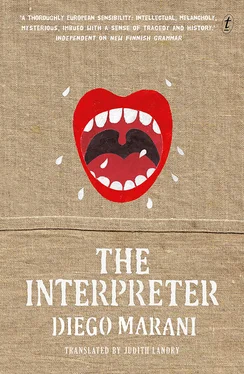I sat bolt upright, suddenly remembering the list of cities I’d found in the interpreter’s apartment; Constanta was at the top of those that hadn’t been crossed out.
‘Constanta? And who is “he”?’ I asked, now more confused and troubled than ever by my strange visitor.
‘No, that’s enough! Now I have to stop. Speaking Romanian does me no good at all, it claws at my heart and leaves it bleeding. It…it makes me cry, as you can see. I can’t go on like this. Doctor Barnung will put me into isolation. I’m sorry, you’re so patient with me, and I’m so cruel and unfair to you.’
She burst out sobbing; broken, disarmed and naked, she was proffering me all her pain. I would have liked to take her in my arms, to hold her close — not in the way that Mrs Vukobrat imagined, but because I felt that we had something terrible in common, something most grand, something we could not name but which loomed over us ever more threateningly.
‘I must go, I’m sorry if I’ve not behaved very well. This time, I assure you, it won’t happen again!’ And she ran off, leaving the door ajar. That evening there was no one at her place at table; Ortega told us that she had been put into isolation, with a week’s intensive course in Navajo.
Those days brought me back to reality with a jolt: I suddenly remembered why I was there at all. I had the feeling I’d been wasting my time: once again I had the urgent feeling that I must track down the interpreter.
When she returned from isolation, Roxana seemed changed; she was quiet and self-absorbed, as though she were following some new line of thought. Her jacket pocket now bore the doom-ladened white strip which meant linguistic isolation, but her expression bespoke a new-found peace. She no longer looked alarmed or hunted; rather, she seemed at last to have shaken off that obsessive sense of expectation by which she had previously been dogged. She nodded at me affably when she sat down at table; we kept our questions to ourselves, talking of trivialities, giving Vandekerkhove free rein to unburden himself of as much incoherent babble as he liked. After supper, and a brief goodnight to Mrs Vukobrat, who had come to ask her how she was, Roxana went straight back to her room. I waited for a few moments in the common room together with Ortega, then excused myself and ran to the women’s corridor. I saw the light under her door, knocked and went in without waiting for any answer. Roxana was taking down her hair, and looking at me in the mirror.
‘What is it?’ she asked me brusquely in Romanian.
‘That man. Who was that man?’
‘I don’t know who he was. It may seem strange, but he never did tell me his real name. It started as a game: each day he’d invent a different one. He used to come and visit the aquarium, then we started to meet each other on the beach. Don’t imagine I was a total ingenue. I’d been in love, I knew a thing or two; but he took something from me that no one else ever had. Oh, similar things had happened to me in the past, sometimes I went for months unable to visit certain parts of the city because they reminded me of some lost love, unable to hear a certain song because it would make me cry. As a little girl, certain smells had the power to make me feel unbearably nostalgic; even today, the acrid smell of tar from newly laid asphalt gives me gooseflesh — and only I know why. But with time I’ve learned to protect myself; now I know how to retrieve whatever gets burned in the pyre of my love. For instance, I know now that it’s better always to fall in love in the same spot: placed on top of each other, memories don’t have enough space to burn, they die without leaving any bad smell behind them, and all that is left of the pain is an empty shell. So I thought I’d be able to emerge from this befuddlement unscathed as I had from the rest. What could this man take from me that I hadn’t already lost? How many others had I not already mourned, standing at sunset by the sea, wandering alone through the sunset-streaked sand of a September evening, or along the windswept roads in the winter, when snowy roofs stand out against the dark sky? But the one thing that had never been at stake was my language, and it was that that this man was studying — he already spoke it so well that he took it from me! Now every Romanian word I speak is a torment I inflict upon myself, but it’s also a spark in whose glow I can glimpse the marvellous time when he and I shared one single tongue, and I can’t shake off the false hope that such sparks might rekindle that fire. Instead, though, each time I sink to ever greater depths, and then it’s a huge struggle to come back to the surface. But now that I’m here with my head just above water I feel the call of the abyss, pulling me down; and I no longer have even my language for salvation, I can’t even call out my name, because he’s taken it from me!’
Roxana burst into tears, then, proceeding from tears to fury, she began to tousle the hair she had just been so carefully combing. I gripped her firmly by the arm in an effort to restrain her, but she fought me off with surprising strength, and it was only when I let go of her and retreated towards the door that she quietened down. Throwing herself on the bed, she lay there motionless, her mouth quivering, looking up at the ceiling with bloodshot eyes. ‘Did you know that the Navajo also speak with colours?’ she carried on after a brief pause, her voice still hoarse from sobbing. ‘Sounds have a colour, because according to the Navajo the world was born from four coloured clouds. Scholars have even coined a specific term for the Navajo’s coloured sounds: they call them pigmemes , a combination of pigment and phoneme. So in Navajo, for instance, whiteness is masculine and blackness is feminine, because all things are born of black, and all return to this same blackness when they come to die.’
I drew a chair up to the bed and sat down, taking her hand.
‘Please, calm down, just try to forget about all that; stop tormenting yourself. In fact, why don’t we speak German?’ I suggested.
‘No, please…Let me speak just a little more Romanian. For me, this will be the last time.’
At the time, I did not know what Roxana meant by those words. She apologised for having fought me off so aggressively, but it was I who felt mortified at having yielded to her entreaties. I felt responsible for the sudden worsening of her condition, and for the intensive course in Navajo to which she had been subjected.
‘Don’t worry! A little Navajo has done me good,’ she reassured me with a smile. ‘But I’ve got a question for you too: what makes you so interested in hearing about him?’
‘I know him; he worked for me, but it would take too long to explain,’ I answered evasively. It was then that I was suddenly seized with the fear that Irene too might have met the same end as Roxana, and might even now be locked up in some psychiatric clinic, victim of who knows what form of madness.
‘Do you know where he ended up?’ I asked, returning to the matter in hand.
‘He was on his way to Odessa; I don’t know what he was going to do there.’
‘That’s the second city on the list!’
‘You too know about the list?’
‘Yes. What does it mean?’
‘That’s something I’ve never been able to understand. He was always rewriting it — on tram tickets, on restaurant bills, on newspapers. He’d recite it aloud all the time, like a mantra.’
I waited until Roxana fell asleep before leaving her; there in the moonlight, her face at last looked serene. I went back to my room, found my bag on top of the cupboard and stuffed my things into it. I was lost in a maze of thoughts, and it was a long time before I fell asleep. The following morning I went to Dr Barnung’s study to take leave of him, and his clinic too. He received me without a word and had me sit down in the armchair in front of his massive desk; the bright sunlight lit up our faces, setting the little glass medicine cupboard at the end of the room ablaze as though it were a sacred reliquary. The cat was crouched as ever on the windowsill, licking its paws; a few snowdrops had pushed up through the soil in the garden.
Читать дальше












